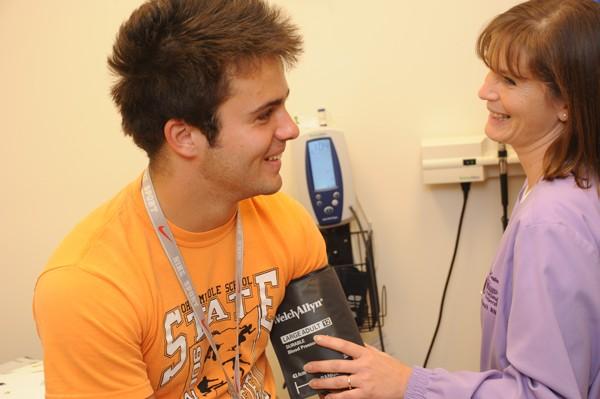Information on the Flu
Influenza (commonly known as the flu) is a viral infection that affects the nose, throat and sometimes the lungs. While different from the common cold, it exhibits similar symptoms, such as a sore throat, runny nose, headache, coughing and fatigue. However, it can quickly reveal more severe effects, such as a fever, weakness and vomiting. Healthy individuals can usually recover from the flu without lasting issues, but high-risk individuals may experience lasting complications and even death as a result of infection. Combined with the presence of COVID-19 and the fact that both viruses are easily spread, it is vital that everyone does their part to avoid contracting the flu.
College students are especially susceptible to contracting flu viruses due to close proximity to one another in residential units and classrooms. We encourage you to be your own health care advocate and to stay updated on current information from the Centers for Disease Control and Prevention.

Preventing and Treating the Flu
Flu Vaccinations
There are known preventative methods to avoid the flu. However, the most reliable way to prevent the flu is to get a flu vaccine.
Ashland University offers flu vaccines to students, faculty and staff. Vaccines are free of charge, while supplies last. Greater numbers of vaccinated individuals lead to a smaller rate of infection and help prevent flu outbreaks on campus.

Self-Care
If you believe you have contracted the flu, do the following to ensure a quick recovery:
- Stay home and keep your distance.
The flu is easily spread. If you are exhibiting flu-like symptoms, please return home as soon as you are able. If you live with high-risk individuals, consider self-isolating in your room as well.
Even at home, it’s important to keep your distance from others. Stay at least six feet away from others and stay out of classes, work, social events and public areas (including campus facilities, such as the student dining center and recreation center). If you do need to go out in public, wear a face mask. Once you’ve been free of a fever (at a temperature of 100° F or less without the use of fever-reducing medicine) for at least 24 hours, you’re likely on the road to recovery. A cough might linger but is not considered reason enough to stay home or self-isolate. - Get plenty of rest.
It’s likely that you’ll feel exhausted. Take it easy. Avoid intense physical activity and unnecessary strain. Stay in bed and sleep when you’re able. Your body will heal more quickly if it has the strength to do so. - Stay hydrated.
The flu can cause a fever, vomiting and diarrhea, all of which can dehydrate you. Drink plenty of clear fluids—you’ll mostly need water, but broth, sports drinks and electrolyte beverages can help as well. If you feel nauseated, take small sips every 20 minutes or so rather than drinking large amounts of liquid all at once. - Cover your coughs and sneezes.
If you feel a cough or sneeze coming on, cover it with a tissue (your elbow or shoulder will work in a pinch). Don’t use your hands—you’ll spread the infection more easily. Dispose of your tissue(s) and wash your hands immediately afterward. - Wash your hands often.
To avoid spreading the flu, wash your hands with warm, soapy water or an alcohol-based hand rub before and after touching doorknobs, keyboards, kitchenware and other common items. - Treat symptoms as needed.
Common treatments for the flu include:- Tylenol (acetaminophen) for aches and pains.
- Do not use Excedrin (aspirin) to treat flu-like symptoms in children or teenagers, as this may cause Reye’s Syndrome.
- DayQuil/NyQuil (antihistamines) for a runny nose and itchy eyes.
- Throat lozenges and cough drops for coughing and a sore throat.
- Decongestants for a stuffy nose.
- Remember that there are others who can help.
Everyone gets the flu at some point, so it’s important to take care of one another when it happens. Ask a friend or family member to deliver drinks, food and medicine as needed. Later on, if they end up getting sick, make sure that you do the same for them.
Ashland University is ready and able to support you as well. If you are on a university meal plan, contact Dining Services to request a sick tray at 419-289-5762. Email your professors and other faculty to inform them of your absence and to prepare for any classwork or assignments you might miss. Ashland University faculty have been encouraged to be flexible with attendance policies and to work with you to ensure that you can complete all requirements for missed classes, even if you’re sick. - If symptoms worsen, contact a health provider.
Get immediate medical care if you experience:- Difficulty breathing or shortness of breath.
- Pain or pressure in the chest or abdomen.
- Confusion or sudden dizziness.
- Severe or persistent vomiting.
- Standard, flu-like symptoms that improve but return with a worsened cough or fever.
Additional resources and health care providers are available on our Resources page. Faculty and staff are encouraged to contact their personal health care provider.